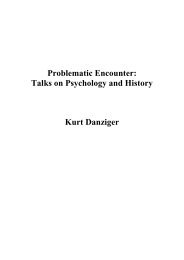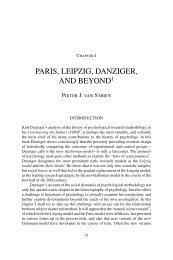The positivist repudiation of Wundt - Kurt Danziger
The positivist repudiation of Wundt - Kurt Danziger
The positivist repudiation of Wundt - Kurt Danziger
You also want an ePaper? Increase the reach of your titles
YUMPU automatically turns print PDFs into web optimized ePapers that Google loves.
THE POSITIVIST REPUDIATION OF WUNDT 22 1<br />
prefers simple means. While the simpler account may sometimes be convenient, it does<br />
not follow that it is bound to be the true one.66<br />
This issue in the philosophy <strong>of</strong> science is closely linked with the diverging beliefs <strong>of</strong><br />
<strong>Wundt</strong> and <strong>of</strong> his immediate successors about the role <strong>of</strong> psychological analysis. One <strong>of</strong><br />
<strong>Wundt</strong>’s original criticisms <strong>of</strong> Kiilpe’s book was that it seemed to limit the task <strong>of</strong> psy-<br />
chology to the analysis <strong>of</strong> the content <strong>of</strong> consciousness into its elements, and that it paid<br />
little attention to the much more important task <strong>of</strong> exploring the role <strong>of</strong> psychic causality<br />
in psychological development. Killpe’s elementism is faithfully reproduced in Titchener’s<br />
first book: “<strong>The</strong> first object <strong>of</strong> the psychologist” is there said to be “to ascertain the<br />
nature and number <strong>of</strong> the mental elements.” 67 Secondly comes synthesis, which involves<br />
the “laws which govern the connection <strong>of</strong> the mental elements,” 68 but the main purpose<br />
in studying synthetic connections is to check on the correctness <strong>of</strong> past analyses and to<br />
facilitate future analyses. One <strong>of</strong> the pervasive differences between <strong>Wundt</strong> and Titchener<br />
relates to the role played by elementary analysis in their systems. For the latter, analysis<br />
into elements became the ultimate scientific task, for the former, it was a limited,<br />
preliminary, and subsidiary task in terms <strong>of</strong> the goals <strong>of</strong> psychology as a whole:<br />
Thus, in the area <strong>of</strong> psychology, to an even greater degree than in that <strong>of</strong> natural<br />
science, analysis into elements is a merely preparatory business that is inadequate in<br />
terms <strong>of</strong> the whole character <strong>of</strong> psychic structures. For all the more important psy-<br />
chological tasks it must be supplemented by causal analysis [<strong>Wundt</strong> means psychic<br />
causality] and the synthesis <strong>of</strong> psychic phenomena which is closely connected with<br />
it.6g<br />
In this connection <strong>Wundt</strong> speaks <strong>of</strong> the impossibility <strong>of</strong> reducing complex mental<br />
contents to their elements and their external interconnections. Those who fail to<br />
recognize this impossibility “overlook the essential difference <strong>of</strong> the attitude <strong>of</strong> natural<br />
science and that <strong>of</strong> psychology.” 70 <strong>The</strong> former is concerned with elements and their con-<br />
nections, but the latter has to become involved with the “internal relationships” <strong>of</strong> part<br />
and whole which create new meanings and new values that are not contained in the<br />
elements and their external connection^.^^ Empirically, the best illustration <strong>of</strong> what<br />
<strong>Wundt</strong> had in mind is to be found in psycholinguistics, to which he devoted a great deal<br />
<strong>of</strong> time and interest. <strong>The</strong> meaning, the value <strong>of</strong> a sentence cannot be derived from the<br />
meaning <strong>of</strong> the verbal elements and the laws <strong>of</strong> syntax.<br />
Social Psychology<br />
Among the many differences that divided <strong>Wundt</strong> and his Machian successors none<br />
is more striking than that which involved their divergent attitudes toward the social and<br />
cultural components in the individual’s mental life. <strong>Wundt</strong> invested such a large proportion<br />
<strong>of</strong> his energies in problems <strong>of</strong> “ethnic” or cultural psychology because he believed<br />
that here one dealt, not with a different subject, but with another side <strong>of</strong> mental activity<br />
that had to complement individual psychology if one was ever to achieve an understanding<br />
<strong>of</strong> mental life as it truly existed. He felt that relevance to the social life <strong>of</strong> man<br />
provided the final test <strong>of</strong> the foundations on which one had built one’s individual psychol~gy,~~<br />
and he expected that in the not too distant future experimental psychology<br />
would take a back seat compared to the study <strong>of</strong> social psychological<br />
By contrast, the Machian psychologists literally had no time for social psychology.<br />
In their rare and brief references to the topic it is mentioned as a possible field <strong>of</strong> application<br />
for individual psychology, certainly not as a complementary discipline <strong>of</strong> equal<br />
dignity and importance. <strong>The</strong> difference in perspective is quite striking. Where <strong>Wundt</strong>





